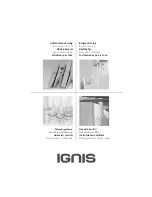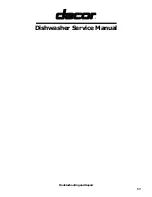
6
To keep drain water from going back into the washer:
■
Do not force excess drain hose into standpipe. Hose should
be secure but loose enough to provide a gap for air.
■
Do not lay excess hose on the bottom of the laundry tub.
Floor drain
Do not install the drain hose form on to the corrugated drain hose.
You may need additional parts. See Floor drain under “Tools and
Parts.”
Connect the Inlet Hoses
The washer must be connected to the water faucets using the
new inlet hoses. Do not use old hoses.
Insert new flat washers (supplied) into each end of the inlet hoses.
Firmly seat the washers in the couplings.
Connect the inlet hoses to the water faucets
Make sure the washer basket is empty.
1. Attach the hose labeled hot to the hot water faucet. Screw
on coupling by hand until it is seated on the washer.
2. Attach the hose labeled cold to the cold water faucet. Screw
on coupling by hand until it is seated on the washer.
3. Using pliers, tighten the couplings with an additional
two-thirds turn.
NOTE: Do not overtighten or use tape or sealants on the
valve. Damage to the valves can result.
Clear the water lines
■
Run water through both faucets and inlet hoses, into a laundry
tub, drainpipe or bucket, to get rid of particles in the water
lines that might clog the inlet valve screens.
■
Check the temperature of the water to make sure that the hot
water hose is connected to the hot water faucet and that the
cold water hose is connected to the cold water faucet.
Connect the inlet hoses to the washer
1. Attach the hot water hose to the bottom inlet valve.
2. Attaching the hot water coupling first makes it easier to
tighten connection with pliers.
3. Screw on coupling by hand until it is seated on the washer.
4. Using pliers, tighten the couplings with an additional
two-thirds turn.
NOTE: Do not overtighten or use tape or sealants on the
valve. Damage to the valves can result.
A. Coupling
B. Washer
Tighten the couplings with an additional two-thirds turn.
A
B
A. Cold water inlet valve
B. Hot water inlet valve
A
B


























